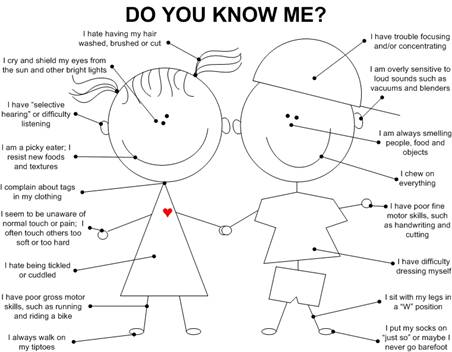What is Sensory Processing?
Sensory processing is the ability to receive, arrange, interpret and respond to information we encounter through our senses.
Did you know we have 7 senses?
1. Auditory – the things we hear
2. Visual – the things we see
3. Tactile – the things we touch and the things we feel
4. Olfactory – the things we smell
5. Gustatory – the things we taste
6. Vestibular – movement
7. Proprioception – body position
Typical processing of this information involves three steps:
Sensory Input – the receptors in our skin, inner ear, eyes and joints are stimulated
Processing – this information is organised, interpreted and perceived
Reaction – A response is generated, i.e. movement or speech
 Things to look out for:
Things to look out for:
A child or adult may have difficulties receiving, processing and/or responding to sensory information. In general a child may be over-sensitive or under-sensitive to information. A person’s sensory processing may differ depending on the type of input, i.e. a person may be over-sensitive to sound and under-sensitive to movement.
The following are common behaviours when a child has difficulty processing sensory information:
Blinking or squinting in response to bright lights, colourful or moving objects (over-sensitive)
School refusal, refusing to walk or leave parent (over-sensitive)
High activity levels, fidgeting and easily excitable (under-sensitive)
Appear to lack initiative, fatigued or lethargic (under-sensitive)
Children with sensory difficulties may also appear uncoordinated, have difficulty participating in social environments or have a tendency to be rigid and inflexible in new environments.
What can parents and teachers do?
Sensory processing difficulties may go unnoticed, and if this is the case then it is unlikely your child needs therapy. However, it becomes an issue when their performance at school, participation in social activities and/or home life becomes interrupted.
There are some strategies you may try if you have noticed any of the difficulties above. For example:
If your child appears over-sensitive to noise – you could minimise the amount of of noise at any time – i.e. turn off the radio and television when you are talking or using household appliances.
If your child appears to be sensory seeking of touch, you could give them some Blu-Tac to manipulate in their hands while the teacher is talking. This is less distracting to them and others than clicking a pen or moving constantly in their chair.
If you have concerns, mention it to your GP for referral to a registered Occupational Therapist. Assessment of your concerns will allow for individualised recommendations and therapy to improve performance across many life areas.
If you or your child are struggling with their sensory processing we offer remote telehealth consultation or if you are in Cleveland or Loganholme book an in-person appointment with our psychologists
Picture Credit: http://www.mct4kids.org
